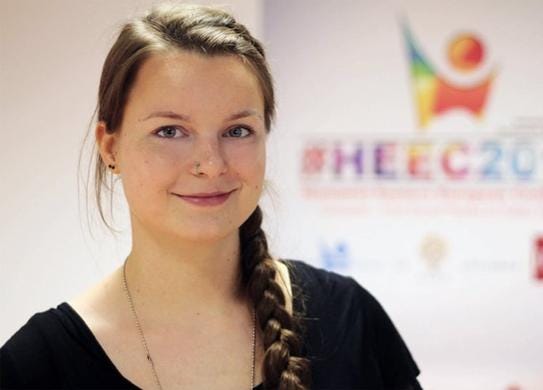Scott Douglas Jacobsen: What is your familial and personal background?
I was born and raised in Hannover, Germany. When I had finished high school, I spent a year in the Philippines for a volunteer service, then moved to Hamburg to study Cultural Anthropology and Educational Sciences. After getting this degree, I moved to Osnabrück and started studying Cognitive Science. Right now, I am in Oswego (New York) for a semester abroad.
I got involved in Hannover’s local group of the youth wing of HVD (Humanistischer Verbands Deutschland, the German Humanis Association) when I was 13 or 14. Since then, I have held different positions in the local and national young humanist organisations and eventually got involved in the International Humanist and Ethical Youth Organization (IHEYO), where I was first elected Membership Officer and now President.

How did you become involved in humanism as a worldview?
Pretty much all of my family members are humanists, so you could say my sister and I were raised this way, though I don’t remember the term “humanism” being used. Our parents and grandparents taught us about this lifestyle not only with words, but by living and acting according to these values every day. We were encouraged to be sceptical and question things, to think for ourselves, to not prejudge people, to take responsibility for our actions, take care of the environment, and be independent.
Also, my parents love to travel and get to know people from different cultures, and I think my sister and I have definitely profited from that. It made us more open-minded towards new things and different ways of life.
When did humanism as an ethical hit home emotionally for you?
Since I was raised with humanist values, there is no specific event or time that marks this. It was simply the worldview I had. You could probably say I found out about the term “humanism” and actively chose to identify as a humanist when I decided to join our local Humanist organisation and take part in their coming-of-age celebration. The next step was becoming a member and actively volunteering for the organization. By doing this, I dedicated myself to the cause, so to say.
What makes humanism more true to you than other worldviews, belief systems?
I think about these things a lot. Ethics, religion, why do we act and feel the way we do? I try to stay objective about it and approach questions openly. And every time I come to the conclusion that humanism is the right way.
I found that the belief in gods does not withstand reason and never understood why people call religion the root of ethics, morals or values, and why they minimise the horrible things it has caused and is causing. Why do you follow rules that only exist to oppress you? Why would you need religion to love thy neighbours?
Some people will argue that being nice to one another is not a necessity or is even “unnatural”, that not caring about others will not cause them any disadvantages. But this is where love and empathy come in, a wish to live in a peaceful and kind society, something that I believe everybody has somewhere inside them.
To me, humanism is the derivation of being a compassionate and reasonable person.
You are the President of International Humanist and Ethical Youth Organization (IHEYO). It was launched in 2004. What tasks and responsibilities come with this position?
As President, I am taking the bird’s eye view. I know what is going on in the organisation and coordinate and connect people and activities. There are also decisions to be made, but I always make sure to consult with other committee members first because I want to get to know other peoples’ thoughts and perspectives before deciding on something that will affect the organisation and the people involved.
IHEYO works on a broad range of initiatives, and with multiple organisations, including women’s rights, education rights, abortion rights, LGBTIQ rights, human rights. What are some of the notable successes in each of these domains?
Though some events and activities are directly planned by us, our job is more to be an umbrella organisation connecting our member organisations.
For example, in November 2015, we held the charity week “Better Tomorrow”. We came up with the concept and asked our members to contribute with projects they thought of and planned themselves.
There are conferences that are planned by IHEYO in cooperation with the respective local member organisations. We provide know-how and funds for the events. Many of our volunteers are active in both IHEYO and their local organisations so cooperation is made easy. Alone this year there were three conferences in addition to our annual General Assembly. These conferences were the African Humanist Youth Days (AFHD) in July in Nairobi (Kenya), the European Humanist Youth Days (EHYD) in July in Utrecht (Netherlands) and the Asian Humanist Conference in August in Taipei (Taiwan). During each conference, there are talks and workshops that are somewhat connected to humanism.
For example, during the EHYD we had a workshop on Effective Altruism, AHYD had panels about witch-hunts, and the Asian Conference featured a talk about secular values in traditional beliefs. Some talks/workshops are held by member organisations, others by people from outside of the organisations that were invited. This way the participants can gain knowledge and know-how while at the same time spreading their own knowledge and letting others profit from their experience. Also, events like that are the best opportunity to network and come up with new ideas. We are a growing community, with growing influence, thanks to this.
So it is hard to measure our impact in numbers or clearly defined achievements. We are more about providing the basis for our members’ work and incentives to individuals. A panel like the one at EHYD, with Bangladeshi bloggers who have been threatened and prosecuted because they openly criticised religion, leads to a change of mind in the audience that can eventually bring huge change.
Any personal humanist heroes?
This sounds cheesy, but my humanist heroes are the people that put their free time and their energy into IHEYO or other humanist organisations. There is always a lot to do and it is great seeing so many people work hard for this cause.
Especially work in an executive committee involves some boring and annoying tasks, particularly when handling bureaucratic stuff. Behind every meeting and every event, there is someone writing minutes, someone putting data into spreadsheets, someone handling the numbers and keeping an eye on the finances… I am very grateful for everybody who does this as it builds the base for successful projects.
Any recommended authors?
I have not had time to read a lot of books lately, but I read many blog articles and can definitely recommend that. There is something about articles written by non-professionals who just want to express their thoughts. Especially when you know the person or they provide background knowledge about themselves. It is so interesting to see their thought process and how they form their opinions. It helps understand why they have this opinion, even or especially if you don’t agree with it. Also, many blogs allow to comment on articles and possibly discuss with the author, so in the end everyone can benefit.
Thank you for your time, Marieke.






Article Discussion